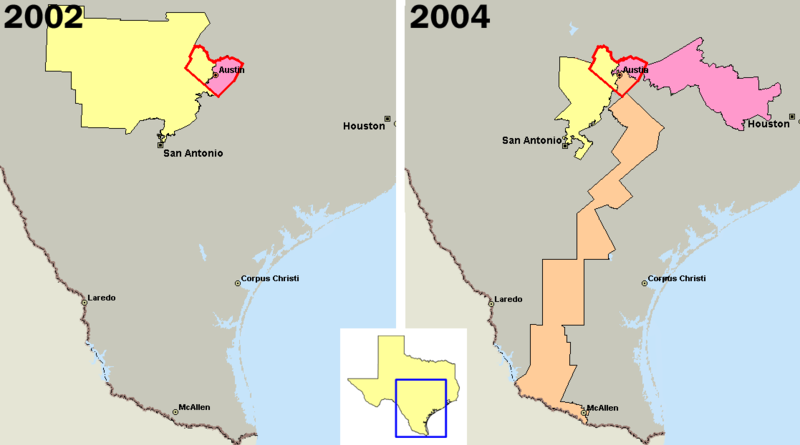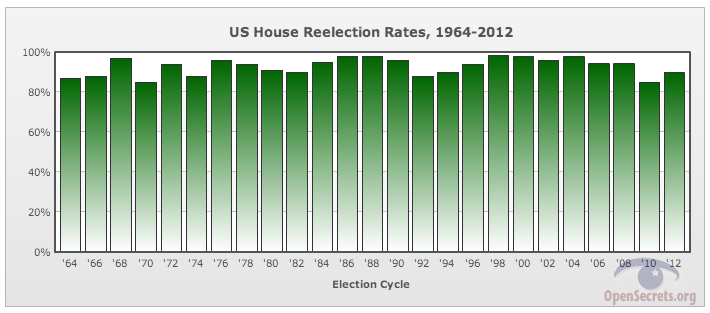The government shutdown is over. Two weeks and 20 billion dollars later, there are several stories coming out of this debacle. Americans are angry at Congress. The Republican party is divided. Obamacare still exists.
However, buried within each article I’ve read is what I consider the real cause of this debacle and the current political cold war.
Here it is in a New York Times article today entitled Losing a Lot to Get Little:
The worry among many Republicans is that the Tea Party flank will not get the message, mainly because their gerrymandered districts are so conservative they do not have to listen.
From a New Yorker article on the Tea Party caucus who demanded the shutdown:
Through redistricting, Republicans have built themselves a perhaps unbreakable majority in the House. But it has come at a cost of both party discipline and national popularity.
So, what is gerrymandering or redistricting? Let’s go to Wikipedia shall we?
In the process of setting electoral districts, gerrymandering is a practice that attempts to establish a political advantage for a particular party or group by manipulating district boundaries to create partisan advantaged districts.
Both parties are guilty of abusing this practice and creating districts that look like Rorschach tests instead of geographic areas.
Whether or not you agree with shutting down the government doesn’t really matter. As a strategy it failed and the 80 members of Congress who put forth this strategy will suffer no electoral consequences because the districts they live are drawn in such a way that they will never have to.
Listen, 60% of Americans want to fire every member of Congress. And yet, 90% of Representatives will be re-elected.
NINETY PERCENT.
This goes way beyond those 80 members. They just made the lesson obvious. When you are held accountable only by voters who wholeheartedly agree with your (sometimes) extreme ideological positions, what interest do you have in compromising? What interest do you have in legislating at all?
I defend Congress. I defend Congress a lot. So often people will yell and scream about how every politician is a crook and we need to kick the whole lot out. I don’t believe that. I don't believe that if we just fired every member of Congress the problem would be solved.
I worked in Congress. Yes, I would argue about 15% of politicians are crooks. Just like 15% of teachers and bankers and garbage men are crooks. It is a political system composed on human beings and human beings aren’t perfect.
More importantly, when put within a system that rewards ideological extremism and punishes compromise, human beings will react accordingly. These men and women want to keep their jobs. They believe in what they do and they want to keep doing it.
Thanks to gerrymandering too often that means shutting the government down instead of working to make it run properly.
So what do we do?
Several reforms have been proposed. Independent Redistricting Commissions were seen as a solution early on. Under this reform, a bipartisan commission would have to draw the district lines so that each electoral district was competitive. However, many have argued this leaves minorities and smaller interest groups underrepresented.
What’s proportional representation? Instead of having to win the most votes, representation is divided proportionally and elected officials need only pass a certain threshold to win elected office.
Let’s say you have a “super district” that sends four members to Congress. Instead of one person having to flip flop and sell out to make the most people in the district (who most likely don’t agree with each other) vote for them, each candidate can honestly and accurately court the proportion of the population that agrees with their positions. He or she only needs to be one of the top four vote-getters to go to Congress, where they will represent a coalition of supporters instead of one ideological group.
Several state and local governments already use proportional representation to elect city commissioners or state representatives so there’s no reason to believe it could work on a wider level.
Honestly, I don't know if this is the right solution. I do know that this endless cycle of Americans hating Congress and repeatedly re-electing their Congressmen and Congresswomen has got to stop. In order to find a real solution, we have to be honest about the problem.
What are your thoughts? Do you feel fairly represented? Do you hate Congress but love your Congressperson?




